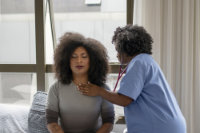Each year on 17 May, the world marks the International Day Against Homophobia, Biphobia, and Transphobia (IDAHOBIT) – a call to action to eliminate discrimination against lesbian, gay, bisexual, transgender and queer (LGBTQ+) people in all aspects of life, including health care. It commemorates the day in 1990 when the World Health Assembly stopped classifying homosexuality as a mental disorder.
Stigma and discrimination persist as powerful barriers to health access for LGBTQ+ people. This is especially harmful in the context of access to HIV and STI services, where fear of judgement or mistreatment can delay, or even prevent, individuals from seeking testing, treatment, and support. In several countries of the Asia-Pacific region, including the Philippines, these barriers have contributed to rising rates of HIV and other STIs, particularly among young key populations who are least likely to access services despite having the greatest need.
In the Philippines, a community-led organization called LoveYourself is breaking these barriers through a dual approach: providing inclusive, affirming health services for LGBTQ+ communities, and working with health-care providers from the public health sector to build understanding and reduce stigma and discrimination from within the system.
/global-hiv-hepatitis-and-stis-programmes-(hhs)/love-yourself-philippines-clinic.jpg?sfvrsn=41bf4692_7)
© LoveYourself
LoveYourself’s community-run clinics offer safe, judgment-free environments where individuals can access HIV services, mental health care, and peer support. LoveYourself has replicated their initiative by capacitating over 50 other community-based organizations across the country with financial support from the Global Fund. Some of these clinics are certified by the Department of Health and are included in the health insurance system, becoming an integral part of the national health system.
“If we make our spaces safe, communities will access them,” says Danvic Rosadiño, Head of Programmes and Innovations of LoveYourself Inc. “Beyond just medications and test results, people have psychosocial needs. We learn how to address both – without shutting down their stories or identities.”
Through partnerships with hospitals, private and community-run clinics, and the Department of Health, LoveYourself trains health professionals on topics such as sexual health, transgender care, and mental well-being. These sessions integrate conversations about stigma and discrimination, which are often overlooked in formal medical training. The organization also supports the development of HIV workplace policies and public health messaging and more recently has also focused on mpox prevention.
While LGBTQ+ people in the Philippines are not criminalized, social acceptance remains uneven and continues to evolve. “It's more tolerated than embraced,” says Danvic. “But we’re seeing change, step by step, and that gives us hope.”
/global-hiv-hepatitis-and-stis-programmes-(hhs)/dr-meg-doherty-with-volunteers-from-loveyourself-philippines.png?sfvrsn=21423e0a_7)
© LoveYourself
“Discrimination is not just a social issue – it’s a health systems issue,” says Dr Meg Doherty, Director of WHO’s Global HIV, Hepatitis and STI Programmes. “To end AIDS as a public health threat and work towards health for all, we must transform the way health services are delivered: with compassion, equity, and respect for everyone regardless of their sexual orientation or gender identity.”
This IDAHOBIT, WHO reaffirms that health is a human right. Acts of discrimination in health settings violate rights and must not be tolerated.

